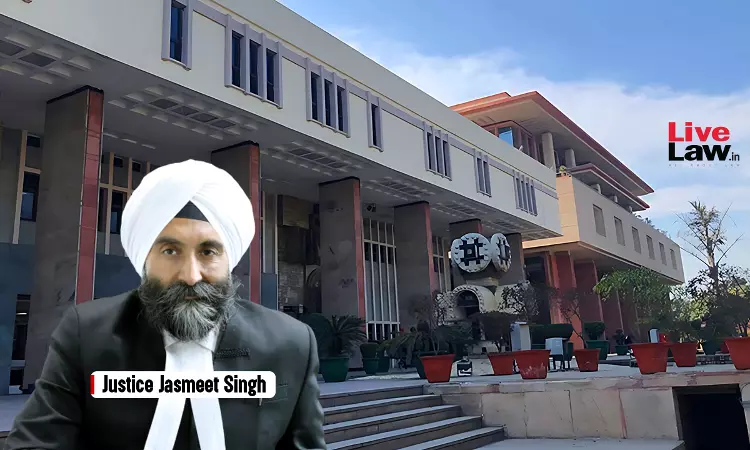- Home
- /
- High Courts
- /
- Delhi High Court
- /
- 'Soliciting Illegal Gratification...
'Soliciting Illegal Gratification From Students Strikes At Core Of Academic Integrity': Delhi HC Upholds Termination Of DU Prof
Mohd Malik Chauhan
16 Sept 2025 1:35 PM IST
The Delhi High Court bench of Justice Jasmeet Singh refused to set aside the termination of a Delhi University professor on the ground of seeking illegal gratification from students. The Court held that the professor was given a proper opportunity of being heard and that the Appeals Committee had carefully examined the evidence and testimonies before ordering her termination."The...
The Delhi High Court bench of Justice Jasmeet Singh refused to set aside the termination of a Delhi University professor on the ground of seeking illegal gratification from students. The Court held that the professor was given a proper opportunity of being heard and that the Appeals Committee had carefully examined the evidence and testimonies before ordering her termination.
"The misconduct proved, namely solicitation of illegal gratification from students, is grave and strikes at the core of academic integrity and thus, the Appeals Committee recorded reasons for affirming each of the charges against the petitioner," the court said.
Background
The present petition was filed under Section 34 of the Arbitration and Conciliation Act, 1996 (Arbitration Act), challenging the Award dated 23.10.2012 passed by the Appeals Committee constituted under Clause 9 of Annexure to Ordinance XII of the University of Delhi.
The petitioner submitted that in the present case, the Governing Body failed to issue a further show cause notice on the inquiry report, did not record independent findings and directly imposed dismissal, in contravention of Clause 6 and judicial pronouncements in Dr. M.S. Frank v. Delhi University & Ors., 2015.
It was further argued that the call was made from the phone of a student but recorded on the device of another student, raising grave doubts of tampering. No forensic verification was conducted. Nevertheless, both the Inquiry Committee and the Appeals Committee accepted the transcript as “natural and reliable”, ignoring basic evidentiary safeguards.
It was further contended that the petitioner has crossed the age of superannuation and seeks only the removal of stigma. In exercise of powers under Section 34 of this Act, this Court may modify the arbitral award and substitute dismissal with voluntary retirement.
The Respondent submitted that the petitioner admitted the recorded conversation presented in the case but failed to demonstrate that it was tampered with when the court asked the petitioner. Therefore, it cannot be said that the petitioner was not given an opportunity to present her case.
It was further contended that the Governing Body already modified dismissal into simple termination so that the petitioner could receive all retiral dues. The petitioner accepted the benefits and having done so, cannot now seek further modification of the penalty.
Findings
The court relied on the Supreme Court's Judgment in Rattan Singh where it was held that strict rules of the Evidence Act are not applicable to domestic affairs. What is required is some material which is logically probative for a prudent mind.
In the present case, the recorded conversation was duly corroborated by a witness and her contentions that the tape was edited were rejected by the Appeals Committee as implausible.
It further observed that the proceedings reveal that the petitioner was afforded multiple opportunities to challenge the witness and to lead her own evidence, which she failed to utilise. The law is well settled that where testimony is unchallenged, it constitutes adequate proof of the charge.
The court further held that it is evident that the allegation of demand and acceptance of a pearl string was clearly established. The testimony of Meghna Khanna was consistent and the petitioner failed to discredit her testimony in cross examination. The petitioner failed to discredit her evidence or to establish any element of coercion or fabrication. Both Committees concurrently accepted her version, finding the demand and acceptance of illegal gratification to be proved.
It further observed that mere allegations of bias are not sufficient. Cogent materials must be presented to demonstrate bias. In the present case, the petitioner failed to present any material to show that the members of the Inquiry Committee were bias.
The court also rejected her plea of not being represented by a legal practitioner on the ground that unless rules governing the proceedings provide for the litigant to choose a legal practitioner of her own choice, such a right cannot be claimed as a matter of right as held by the Supreme Court in National Agricultural Coop. Mktg. Federation of India v. Alimenta S.A. This ruling was clarified in Board of Trustees of the Port of Bombay v. Dilipkumar Raghavendranath Nadkarni, (1983) where it was held that legal representation may be allowed in exceptional cases. However if the presenting officer is legal trained, it is not an absolute right.
The court held that the misconduct of soliciting illegal gratification from the students is grave and strikes at the very root of academic integrity. The Appeals Committee gave its findings supported by adequate reasons and showed equity by modifying the nature of punishment from dismissal to termination which benefitted the petitioner. The further plea of the petitioner to change the termination into voluntary retirement is untenable. The Supreme Court in Gayatri Balasamy empowered the court to modify the award but only in exceptional circumstances.
Accordingly, the present petition was dismissed.
Case Title: DR THELMA J TALLOO Versus JESUS AND MARY COLLEGE & ANOTHER
Case Number: O.M.P. 150/2013
Judgment Date: 12/09/2025
For Petitioner: Mr. Yasobant Das, Senior Advocate with Mr. Arunav Patnaik, Mr. Nirbhay Nitya Nanda, Advocates
For Respondent: Mr. Romy Chacko, Senior Advocate with Mr. Joe Sebastian, Mr. Akshat Singh, Mr. Ashwin Romy, Advocates for the Respondent No. 1.
Ms. Manisha Singh, Advocate for the Respondent No. 2.



